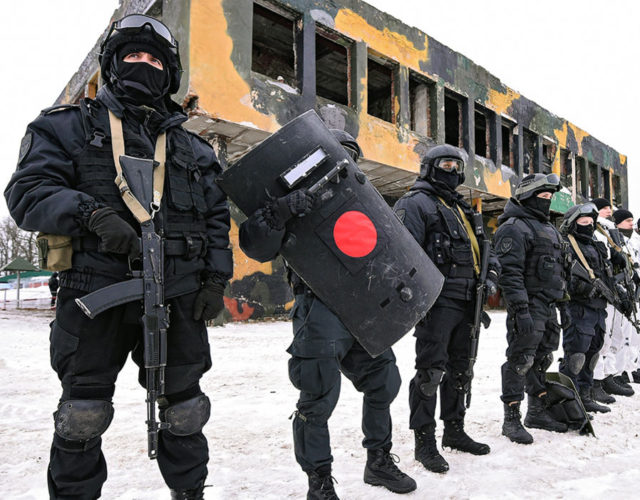
Russian National Guard: A New Oprichnina, ‘Cyber Police’ or Something Else?
Publication: Eurasia Daily Monitor Volume: 14 Issue: 38
By:

Created in April 2016, the Russian National Guard (Rosgvardia—see EDM, April 7, 11, 12, 18, 2016) is turning into a much more formidable weapon in the hands of the Kremlin than was initially expected. If the most recent information pertaining to this structure proves correct, Russian society can expect a daunting new era in its post-Soviet history.
On March 14, officials announced that “in the nearest future” Rosgvardia might become a virtually autonomous, fully fledged militarized structure (Rosbalt, March 14). For this purpose it has been allocated certain rights and responsibilities that are to be transferred from the Ministry of Internal Affairs of the Russian Federation (MVD)—combating terrorism and protecting the state, among others. In addition, the National Guard is authorized to conduct search and investigative activities, thus making its functions particularly similar to those of the Russian police. Taking into consideration the fuzziness of such notions as “terrorism” and “extremism” and their contradictory interpretation in Russian law (see EDM, November 25, 2014; July 15, 2016; December 16, 2016), the consequences of this could be profound.
The Russian media is predicting dramatic transformations coming to the MVD as a result of the expansion of Rosgvardia’s responsibilities and competencies. Moreover, the Federal Security Service (FSB) is also primed to assume more positions within the MVD apparatus. Rosgvardia officials’ reaction to this reporting ensued immediately. Colonel General Sergey Melikov (the organization’s first deputy director) claimed that the Russian National Guard will not be given any additional functions “other than those outlined in the Federal Law,” adding, however, that Rosgvardia is still in the process of formation, and its final shape is yet to be totally clear. Melikov also added that “for now” changes will not ensue (Rosgvard.ru, March 15).
Further new information pertaining to Rosgvardia began to surface on March 14. According to reports, Rosgvardia is to include a special unit tasked to deal with cyber security and cyber intelligence. Most importantly, the unit’s function will boil down to conducting regular monitoring and analysis of online social networks that “might have extremist content” (Rosbalt, March 16). Most likely, however, the scope of these responsibilities will eventually be expanded to the monitoring of all Internet resources inside the country. Given the intensification of Russia’s activities in the domains of cybersecurity capabilities (both defensive and offensive), this could lead to the security services stiffening their grip over the “Runet” to a much greater degree. At this point however the National Guard’s “cyber intelligence” purview is identified as “informational-analytical,” primarily due to certain legal constraints that preclude Rosgvardia from broader activities of this type (Defence.ru, March 16). Yet, altering the existing legal base is not (and has never been) a major hindrance in Russia. Melikov categorically dismissed such fears. But his statement was not in fact unequivocal: it left room for further speculation on the matter. In other words, while denying this information, the top-ranking official did admit that Rosgvardia is involved in activities in the domain of cyber security (Rosgvard.ru, March 16).
Despite the limited information available and the traditional parsimony of Russian official sources when it comes to providing details, it is still possible to ascertain the most important points: First, Russia has dramatically intensified its efforts to reshape the organizational structure of the special security services—which is inextricably connected with the creation of new structures (such as Rosgvardia) and allocating these more powers. Second, Moscow is determined to enhance its control over domestic Internet resources and critical infrastructure for the purpose of “guarding” the Russian population from “undesirable information”—especially in anticipation of the presidential elections in March 2018.
At this juncture, it is worth pointing out a statement Colonel General Melikov made in December 2016, which helps shed light on both the essence and likely future enhancement of his security service’s powers. Namely, he claimed that in addition to combating “illegal militants,” the National Guard’s activities will be concerned with a whole range of “threats endangering the Russian political regime” (Novayagazeta.ru, December 19, 2016). Moreover, he specifically pointed out that sources of extremism could shift over time and might take various forms and come from different directions (Kasparov.ru, December 19, 2016).
That said, there is one detail pertaining to Rosgvardia and the history of its creation that Russian officials are almost never keen to discuss. It relates to official remarks by the head of the Altay branch of Rosgvardia, Alexander Maul, who openly admitted that this security service was created by Vladimir Putin to deal with “fifth column” agitators and potential revolutionary moods that are purportedly being generated from abroad. Moreover, the official identified Rosgvardia as a “consolidative fist” charged with ensuring stability and social order. Furthermore, he claimed that since the National Guard does not fall within the MVD’s structures, it is directly commanded by President Putin (Censor.net.ua, December 16, 2016). Needless to say, that historical parallels between the National Guard and historical Russian secret police forces, such as the tsarist-era Oprichnina, are continuing to mount.
On the same day Rosgvardia was created last year, a prominent member of Russia’s civil society, Maria Shkliaruk, an expert at the Civil Initiatives Committee, evocatively defined the new security service structure as “muscles without a brain” (Meduza.io, April 6, 2016). Now it appears that in addition to muscles, Rosgvardia is close to gaining the brain, as well. The question however, is what will be the final outcome of this experiment: an obedient tool to ensure domestic “stability” and “order,” or a powerful service that might reanimate the infamous rivalry between the KGB and the MVD of the Soviet period?



